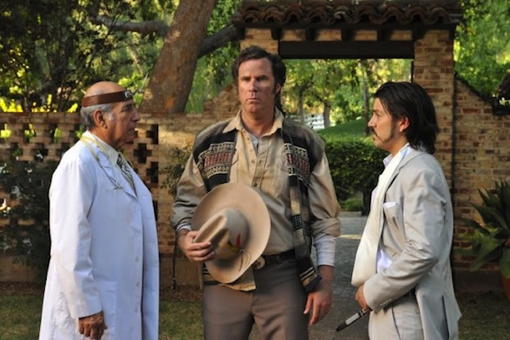By Matt Meier · March 17, 2012

Comedies live and die in their openings. If a movie can’t provoke a few hardy chuckles in its first few minutes, it has already lost its audience by the time the inciting incident rolls around. Conversely, when a comedy provides laugh after laugh through the opening scene, everything that follows becomes that much more entertaining and amusing because the film has already won over its audience.
That “hook-in” moment for Casa de mi Padre arrived before the film even began: the entire theater was howling as soon as the standard opening company credits ended with an emblem for “MexicoScope,” and the laughs grew only louder from there.
Will Ferrell has always been a “power hitter” type of comedian: his lowbrow, farcical comedic style often results in a home run or a strike out, but rarely anything in between. Like many of his previous works, Casa de mi Padre unabashedly aligns itself in the comedic realm of caricatures and absurdity. I cannot rightfully rank Armando Alvarez alongside Ron Burgundy or Ricky Bobby in terms of Ferrell’s most memorable performances, but Casa de mi Padre is as tenacious and witty a film as any you’ll find in the comedy legend’s filmography.
Written by Andrew Steele and directed by Matt Piedmont (both of whom have spent the majority of their careers with SNL and Funny or Die Presents…), Casa de mi Padre is a Spanish Western parody in every sense. Armando (Ferrell) is the lovable loser who wants to prove his worth to his disapproving father, Miguel Ernesto (the late Pedro Armendariz Jr., to whom the film is dedicated), by saving the family ranch from financial ruin. Armando’s brother, Raul (Diego Luna), is the apple of his father’s eye, but his secret life in drug trafficking only augments the family’s woes, and Armando’s love for Raul’s fiancé, Sonia (Genesis Rodriguez), further adds to the sibling rivalry. Combine all this with Gael García Bernal as the merciless drug overlord known simply as the Onza and Nick Offerman of Parks & Recreation as the bigoted DEA Agent Parker in hot pursuit of Raul and you have all the storylines you’d expect of the genre.
But it’s not the plot points and story elements that make this comedy soar, nor the performances of Ferrell and the rest of the talented cast; Steele and Piedmont are the true stars of this parody. Quotable lines mark an important benchmark of any successful comedy, and Steele’s screenplay offers such rapid succession of quips and punch lines that I quickly gave up on transcribing them to relay in this article. But where Steele and Piedmont truly hit their stride is in the film’s self-reflexive absurdity, constantly drawing attention to its own filmic elements. The opening scene itself situates us for what becomes standard throughout the film: Armando pets a young calf and when he picks it up, the real calf has quite clearly been replaced with a stuffed replica that looks nothing alike.
More stuffed animal replicas appear again, including a “horse riding” scene as authentic as a six-year-old riding one of those plastic rocking horses outside your local grocery store, and also a talking White Lion figure that Armando quickly and transparently addresses will play a role in future scenes (and the payoff certainly plays). There are also cheap set designs, editing discontinuities, two driving scenes that replay the same green screen clip behind the “car,” and countless other techniques that Piedmont utilizes to remind us that we are indeed watching a film—one that we must never take to seriously.
The frequency with which the film consciously pokes fun at itself (while comically exploiting various genre conventions and plot points) could prove difficult to swallow for some. Despite demonstration a thorough awareness of the genre it parodies, I’d be remiss to qualify Casa de mi Padre as a truly intelligent comedic piece. Nevertheless, Casa de mi Padre undoubtedly understands what it aims to achieve and never once hesitates in making that bold comedic decision. Those opening minutes perfectly situated my expectations for the farcical western rumpus that lay in store for me over the next 90-odd minutes, a journey through the desert on the saddle of a stuffed horse—a ride I would happily revisit time and time again.